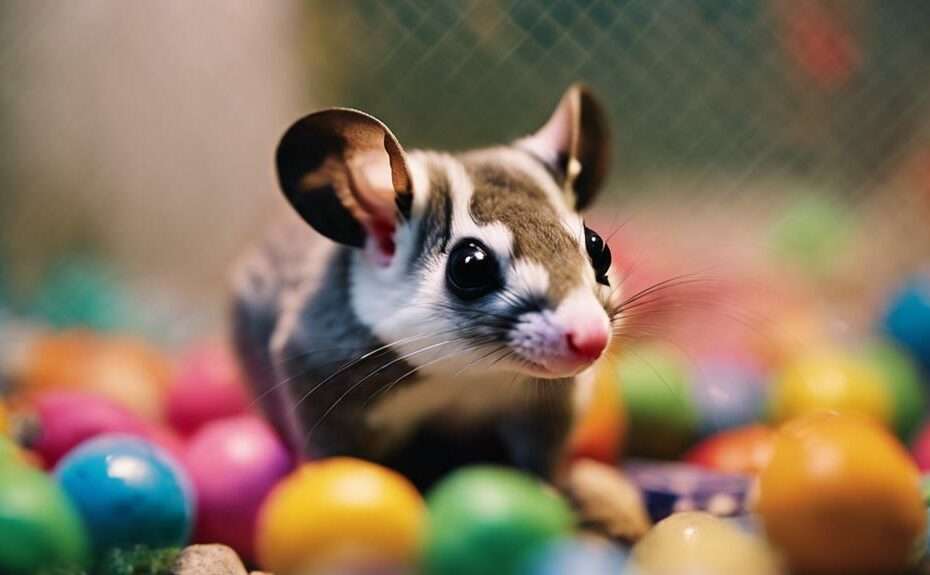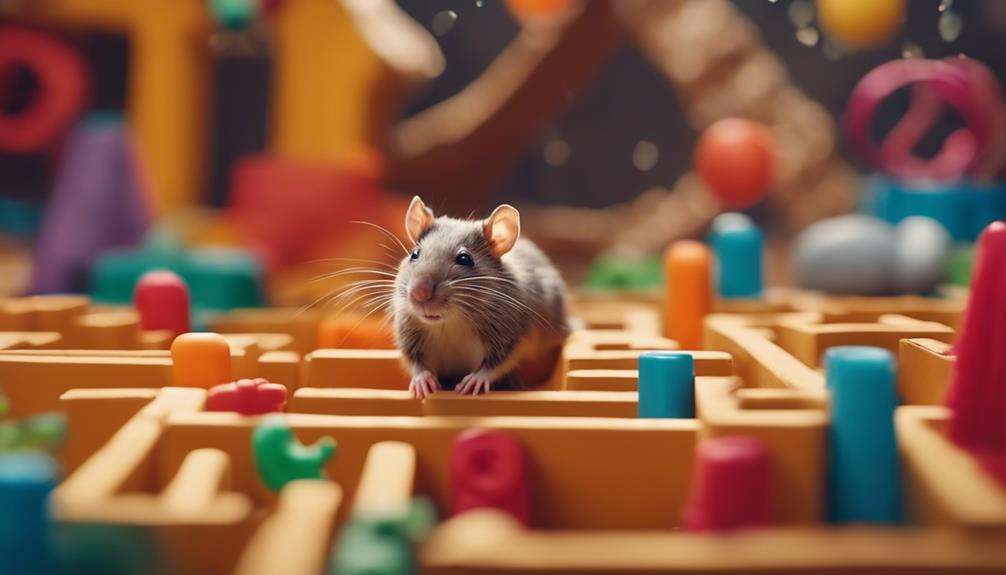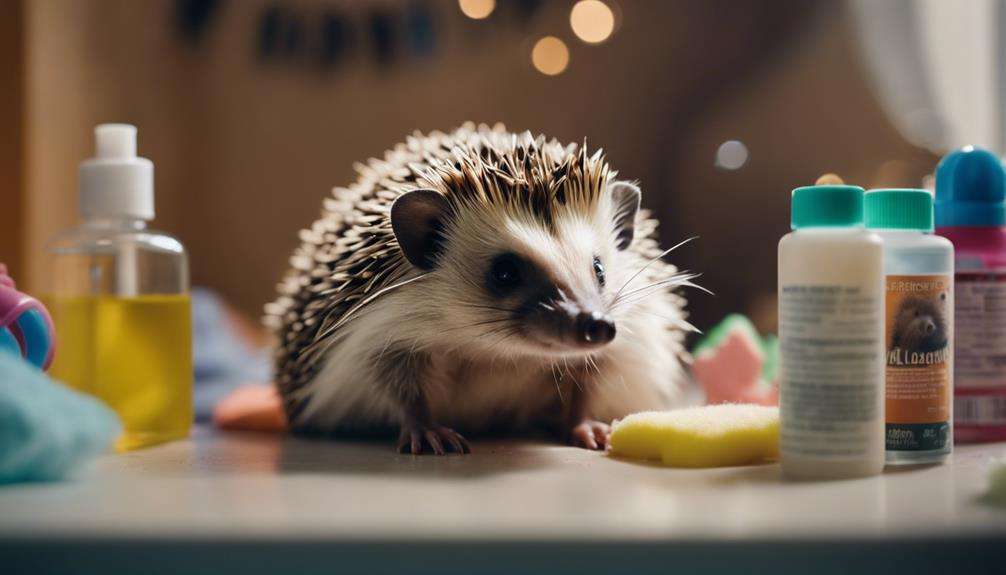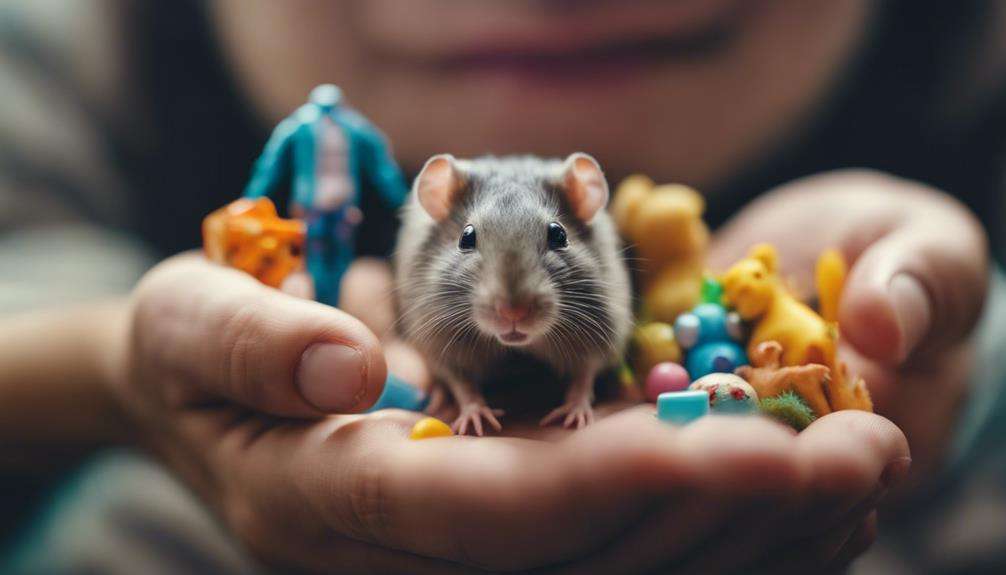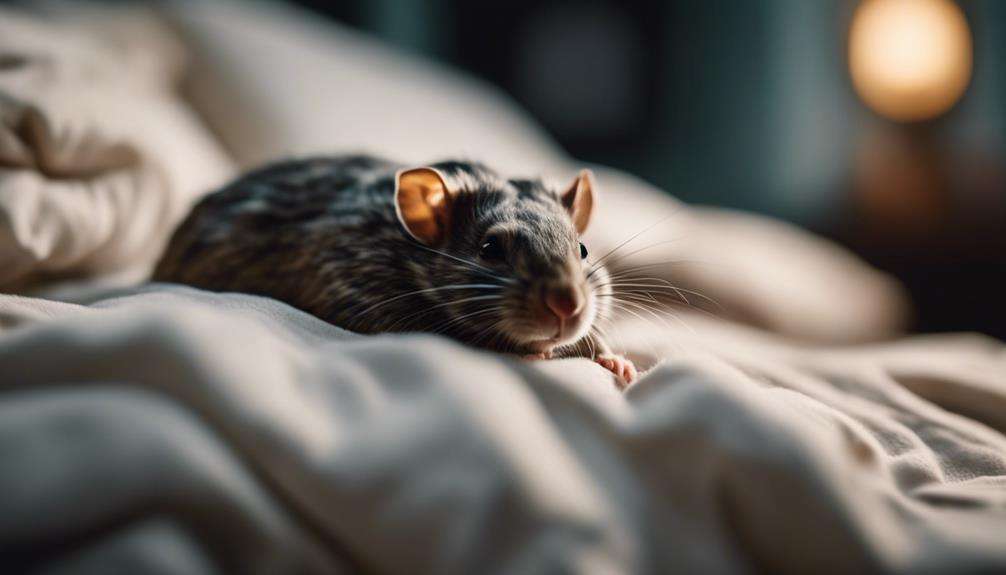Have you ever wondered if it's possible to enjoy the company of exotic rodent pets without breaking the bank? Well, the answer lies in discovering practical strategies to budget effectively for these unique companions.
By uncovering top tips for managing costs while providing quality care for your exotic rodent pets, you can ensure a harmonious balance between financial responsibility and pet ownership.
So, let's explore together how you can optimize your budgeting skills to meet the needs of your beloved exotic rodent friends.
Key Takeaways
- Choose budget-friendly housing like bin cages or second-hand critter nations.
- Opt for economical diet options such as bulk rat pellets and DIY mixes.
- Engage exotic rodents with affordable enrichment activities for mental and physical stimulation.
- Prepare for veterinary expenses by saving, researching low-cost clinics, and considering pet insurance.
Exotic Rodent Acquisition Costs
When budgeting for exotic rodent pets, determining the acquisition costs is crucial as they can vary significantly depending on the species, breeder, and any additional expenses involved.
Exotic pets, while fascinating, can be less expensive than commonly thought. Prices for these unique creatures range from as low as $20 to around $100, making them accessible to a wider audience.
It's worth noting that rare exotic rodent breeds may cost upwards of $200 or more due to their limited availability in the market.
If you opt for adopting from rescue organizations, you could find some real bargains, with adoption fees typically ranging from $5 to $50. However, remember that there could be additional costs like transportation, permits, and health checks, which can add $50 to $200 to the overall acquisition expenses.
To ensure you get the best deal, researching reputable breeders or adoption centers can help you find exotic rodents at more affordable prices.
Budget-Friendly Housing Options
To provide comfortable accommodations for your exotic rodent pets without breaking the bank, explore budget-friendly housing options such as bin cages or second-hand critter nations. Bin cages, made from plastic storage bins, are an affordable and spacious choice for small pets like hamsters or gerbils. They provide ample ventilation and room for your pets to move around.
Second-hand critter nations, often available online or in local pet stores, offer a more durable and aesthetically pleasing option for your furry friends. These pre-owned cages are usually in good condition and can be a cost-effective solution for housing your exotic rodents.
When setting up these budget-friendly housing options, consider using cardboard or paper items as free enrichment tools for your pets' cages. These simple additions can provide mental stimulation and entertainment for your small pets without any extra cost. Additionally, opt for kiln-dried pine or aspen bedding, which isn't only economical but also safe and comfortable for your exotic rodent pets.
Economical Diet Choices

For cost-effective ways to provide a nutritious diet for your exotic rodents, consider implementing economical choices like bulk purchasing high-quality rat pellets or creating DIY mixes using affordable ingredients. Opting for bulk purchases of rat pellets can help you save money on food expenses while ensuring your pets receive the necessary nutrients.
Additionally, creating DIY mixes with grains, seeds, and dried vegetables can be a budget-friendly way to offer a varied diet to your rats.
Incorporating fresh fruits and vegetables into your rodent's diet is another economical option to provide essential nutrients. Look for sales and discounts on safe rat treats like dried fruits, nuts, or yogurt drops to manage costs without compromising on quality.
Rotating different protein sources such as cooked eggs, mealworms, or tofu can also help diversify your rat's diet without exceeding your budget. Remember that a balanced diet is crucial for the health and well-being of your exotic rodents, including guinea pigs.
Affordable Enrichment Activities
When looking to enrich the lives of your exotic rodent pets without overspending, consider engaging them with DIY toy ideas. This can stimulate their minds, provide physical exercise, and prevent boredom. Encouraging their natural habitat exploration and challenging them with interactive feeding puzzles are also great options. These activities are cost-effective solutions for budget-conscious pet owners.
DIY Toy Ideas
Crafting engaging toys for your exotic rodent pets can be both fun and budget-friendly when using simple household items like cardboard tubes and paper bags. Repurpose items like cardboard boxes, egg cartons, and wooden blocks to create stimulating toys for your beloved pets that aren't only easy to care for but also show them love through enrichment activities.
Get creative by building maze-like structures with old shoeboxes, PVC pipes, or paper tunnels to keep your exotic rodents mentally and physically active. Hanging toys made from safe materials such as untreated wood, sisal rope, or bird-safe beads can provide entertainment.
DIY foraging toys hidden with treats in egg cartons or small containers encourage natural behaviors and mental stimulation in your exotic rodent pets.
Natural Habitat Exploration
Enhance your Guinea Pig's environment affordably by incorporating natural elements like branches, rocks, and safe plants for climbing and exploration.
Here are some tips for natural habitat exploration:
- Branches: Provide sturdy branches for climbing and perching, mimicking their natural behavior of navigating through trees.
- Rocks: Place rocks of varying sizes in the enclosure to create hiding spots and encourage physical exercise as they navigate around them.
- Safe Plants: Introduce non-toxic plants like spider plants or wheatgrass to add a touch of nature and provide nibbling opportunities for sensory enrichment.
Interactive Feeding Puzzles
To further engage your exotic rodents and provide affordable enrichment, consider introducing interactive feeding puzzles into their daily routine. These puzzles offer mental stimulation and prevent boredom by mimicking natural foraging behaviors, encouraging physical activity and mental engagement.
Affordable options include DIY puzzles crafted from items like cardboard tubes, egg cartons, or small boxes. Additionally, commercially available feeding puzzles designed for rodents are a convenient choice.
To keep your pets entertained, regularly rotate and change the puzzles to provide new challenges. By incorporating interactive feeding puzzles, you can enhance your exotic rodents' overall well-being while offering them a fun and engaging way to satisfy their natural instincts.
Managing Veterinary Expenses
When managing veterinary expenses for your exotic rodent pets, it's essential to establish a dedicated fund to cover potential care costs. Here are some tips to help you effectively manage these expenses:
- Set up a Vet Fund: Save $20-$30 monthly to ensure you have funds available for any unexpected rat care expenses. This proactive approach can help alleviate financial stress when your pet needs medical attention.
- Budget Wisely: Plan for annual wellness exams costing between $40-$60 and potential illness expenses that could reach up to $150 per visit. Having a clear budget in mind will prevent any financial surprises when visiting the vet.
- Explore Affordable Care Options: Research low-cost veterinary clinics or exotic pet specialists that cater to rodents. These establishments often provide quality care at a more affordable price point. Additionally, consider pet insurance coverage for exotic animals like rats to help with unexpected health issues.
Cost-Effective Grooming Techniques
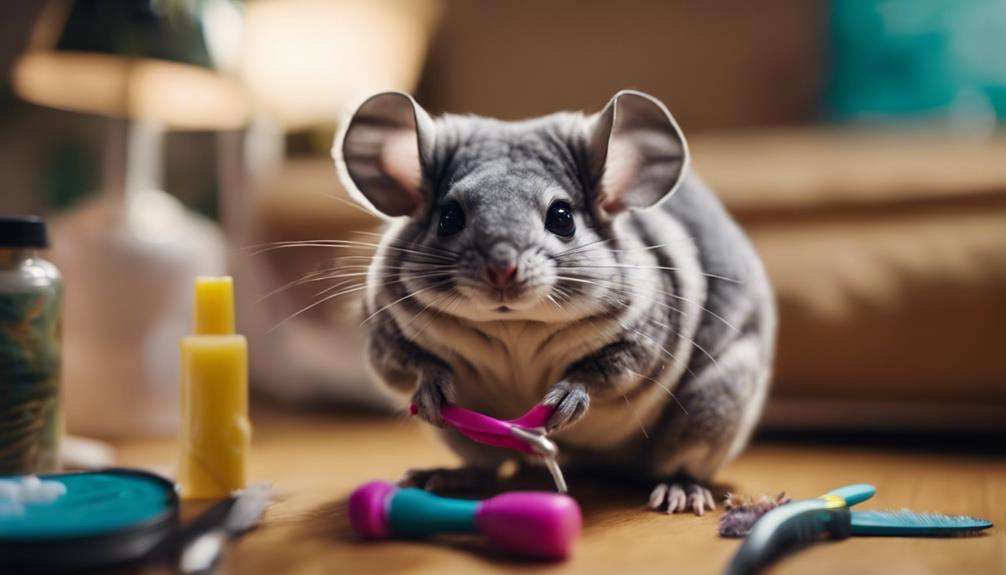
Establishing cost-effective grooming techniques for your exotic rodent pets can't only save you money but also contribute to their overall health and well-being. When caring for your exotic rodent, consider using a soft-bristled toothbrush to gently brush their fur. This simple method promotes healthy grooming without the need for expensive tools.
Additionally, you can save on professional grooming costs by trimming your exotic rodent's nails at home with pet nail clippers.
For exotic rodents like chinchillas, providing a dust bath using inexpensive chinchilla dust helps maintain their coat's cleanliness. To spot-clean your pet between baths, opt for affordable baby wipes. These wipes are effective in keeping your exotic rodent's fur clean, reducing the frequency of costly grooming sessions.
Furthermore, offering chew toys made of safe materials is a budget-friendly way to help your exotic rodent naturally groom their teeth. By incorporating these cost-effective grooming techniques into your pet care routine, you can ensure that your exotic rodent stays healthy while saving money on grooming expenses.
Long-Term Financial Planning
When planning for the long-term financial well-being of your exotic rodent pet, it's crucial to set aside a specific amount monthly for potential vet visits. This ensures you're prepared for any health issues that may arise.
Researching and comparing costs for bedding options like kiln-dried pine or aspen allows you to make an economical yet safe choice for your pet's comfort.
Additionally, exploring affordable cage options and investing in quality food can help you save in the long run while providing a secure and fulfilling environment for your exotic rodent companion.
Savings for Emergencies
To secure the well-being of your exotic rodent companions, initiating a consistent monthly contribution of $10-20 to an emergency vet fund is crucial for ensuring financial preparedness in the face of unforeseen medical expenses. When planning for emergencies regarding your exotic rodents, consider the following:
- Dedicated Savings Account: Create a separate savings account specifically for your exotic rodent pets' veterinary needs to avoid mixing these funds with your regular savings.
- Routine Check-ups: Budget for regular vet check-ups and preventive care to maintain your exotic rodents' health and catch any issues early.
- Financial Cushion: Having a financial cushion for emergencies ensures that you can provide prompt and necessary medical care for your exotic rodent pets without stress.
Investment in Quality
Ensure the long-term well-being of your exotic rodent companions by strategically investing in quality care products and services that promote their health and longevity. Quality investments in long-term pet care, such as spacious cages and durable accessories, can be budget-friendly in the long run by reducing the need for frequent replacements.
While high-quality bedding and food may have a higher upfront cost, they can improve your exotic rodents' health, potentially lowering future vet bills. Long-lasting toys and enrichment items, though seeming expensive initially, provide mental stimulation and physical activity, supporting a healthier lifestyle for your pets.
Additionally, investing in regular vet check-ups and preventive care is a crucial part of long-term financial planning, as it can help catch any potential health issues early and save money on costly treatments down the road. Plan for emergency veterinary care and unexpected expenses to ensure comprehensive care for your exotic rodent pets.
Tips for Saving on Rodent Supplies

Consider bulk purchasing rodent food like science selective or DIY mixes as a cost-saving strategy for your exotic rodent pets. When looking to save on rodent supplies, here are some tips to help you budget effectively:
- Opt for Economical Bedding: Choose kiln-dried pine or aspen bedding options, which are both cost-effective and safe for your rodents to burrow and nest in.
- Affordable Cage Alternatives: Look for budget-friendly cage options such as bin cages or second-hand critter nations to save on housing expenses while still providing ample space for your exotic pets.
- Utilize Free Enrichment: Incorporate free enrichment options like cardboard or paper items into your rodent's cage to keep them mentally stimulated without additional costs.
Frequently Asked Questions
What Should You Do Before Owning an Exotic Pet?
Before owning an exotic pet, you should take the necessary preparation steps. Research resources thoroughly to understand the specific needs and legal requirements. Connect with experienced owners for insights. Preparation is key to ensuring a fulfilling experience with your new pet.
What Is the Easiest Exotic Animal to Own?
When it comes to owning exotic rodent breeds, you'll find that rats are the easiest. They are low maintenance pets, affordable, and have a short lifespan. Their social nature and diet make them a great choice for various lifestyles.
What Is the Most Profitable Exotic Animal to Breed?
Breeding ethics play a crucial role in determining the most profitable exotic animal to breed. Consider market demand carefully to ensure success in your venture. Choose a species that aligns with your values and meets market needs effectively.
Is Owning Exotic Animals Expensive?
When owning exotic animals, expenses can add up quickly. Researching cost-effective options for food, bedding, and supplies can help. Be diligent in saving for potential vet emergencies. Financial considerations are crucial for exotic pet ownership.
Conclusion
Congratulations on embarking on the exciting journey of owning exotic rodent pets! Remember, budgeting for these unique creatures doesn't have to break the bank. By following the top tips outlined in this article, you can provide excellent care for your furry friends while saving some extra cash.
So go ahead, pamper your exotic rodents without emptying your wallet – they'll thank you with squeaks and squeals of joy!
